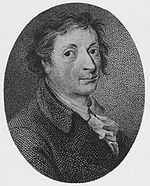Franz Carl Achard
| Franz Karl Achard | |
|---|---|

Franz Karl Achard
|
|
| Born |
28 April 1753 Berlin, Margraviate of Brandenburg |
| Died |
20 April 1821 (aged 67) Cunern, Wohlau, Province of Silesia |
| Nationality | Prussia |
| Fields | Physics, chemistry |
| Academic advisors | Andreas Sigismund Marggraf |
| Known for | Sugar |
Franz Karl Achard (April 28, 1753 – April 20, 1821) was a German (Prussian) chemist, physicist and biologist. His principal discovery was the production of sugar from sugar beets.
Achard was born in Berlin, the son of preacher Max Guillaume Achard, descendant of Huguenot refugees and his wife Marguerite Elisabeth (Rouppert). He studied physics and chemistry in Berlin. He became interested in sugar refining through his stepfather. At the age of 20, Achard entered the "Circle of Friends of Natural Sciences" and met Andreas Sigismund Marggraf, then director of the physical classes at the Royal Academy of Sciences. Achard studied many subjects, including meteorology, evaporation chillness, electricity, telegraphy, gravity, lightning arresters, and published in German and French.
Achard was a favorite of King Frederick II of Prussia, and directly reported to the King on his research twice a week. About a study on the influence of electricity on mental capabilities, Frederick II was reported to have said: If he is able to provide reason for the half wits in my Prussian states using electricity, then he is worth more than his own weight in gold.
In 1776 Achard was elected to the Royal Academy of Sciences at Berlin. Following the death of Marggraf in 1782, Archard went on to become the director of the physical classes of the academy. In 1782 he was elected a foreign member of the Royal Swedish Academy of Sciences.
For his discoveries in the acclimatisation of tobacco to Germany, the king granted him a lifetime pension of 500 taler. Achard was also esteemed by Frederick William II of Prussia.
Achard revived the discovery by Marggraf in 1747 that sugar beets contained sugar, and devised a process to produce sugar from sugar beets. Beginning in 1789, he planted various sugar-bearing plants on his manor in Kaulsdorf near Berlin. Because of their efficiency, he soon preferred sugar beets. In the following year he studied different varieties of beets and the influence of fertilisers. The research was interrupted when Kaulsdorf manor burnt down and had to be sold. Achard later continued on the manor Französisch Buchholz.
...
Wikipedia
